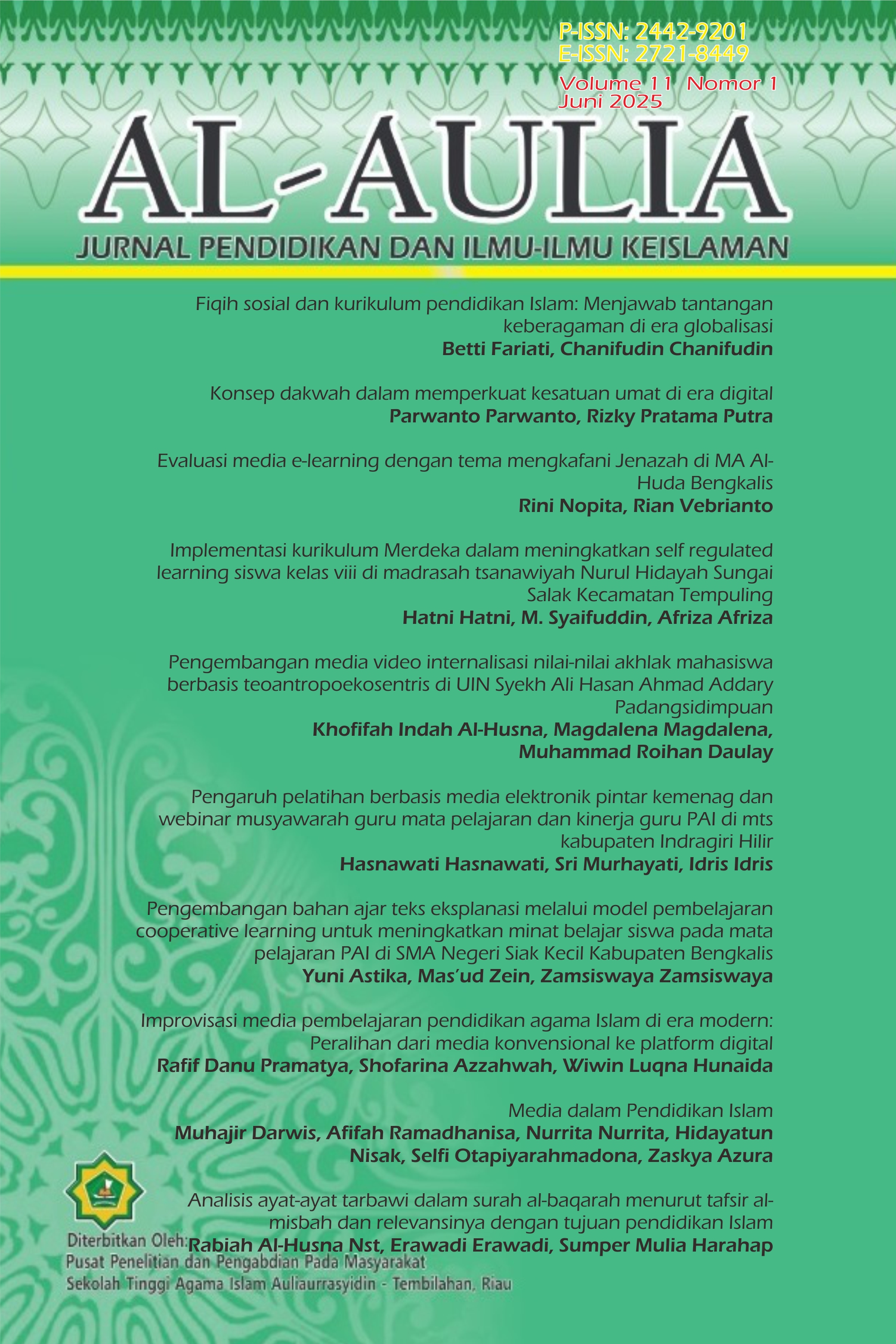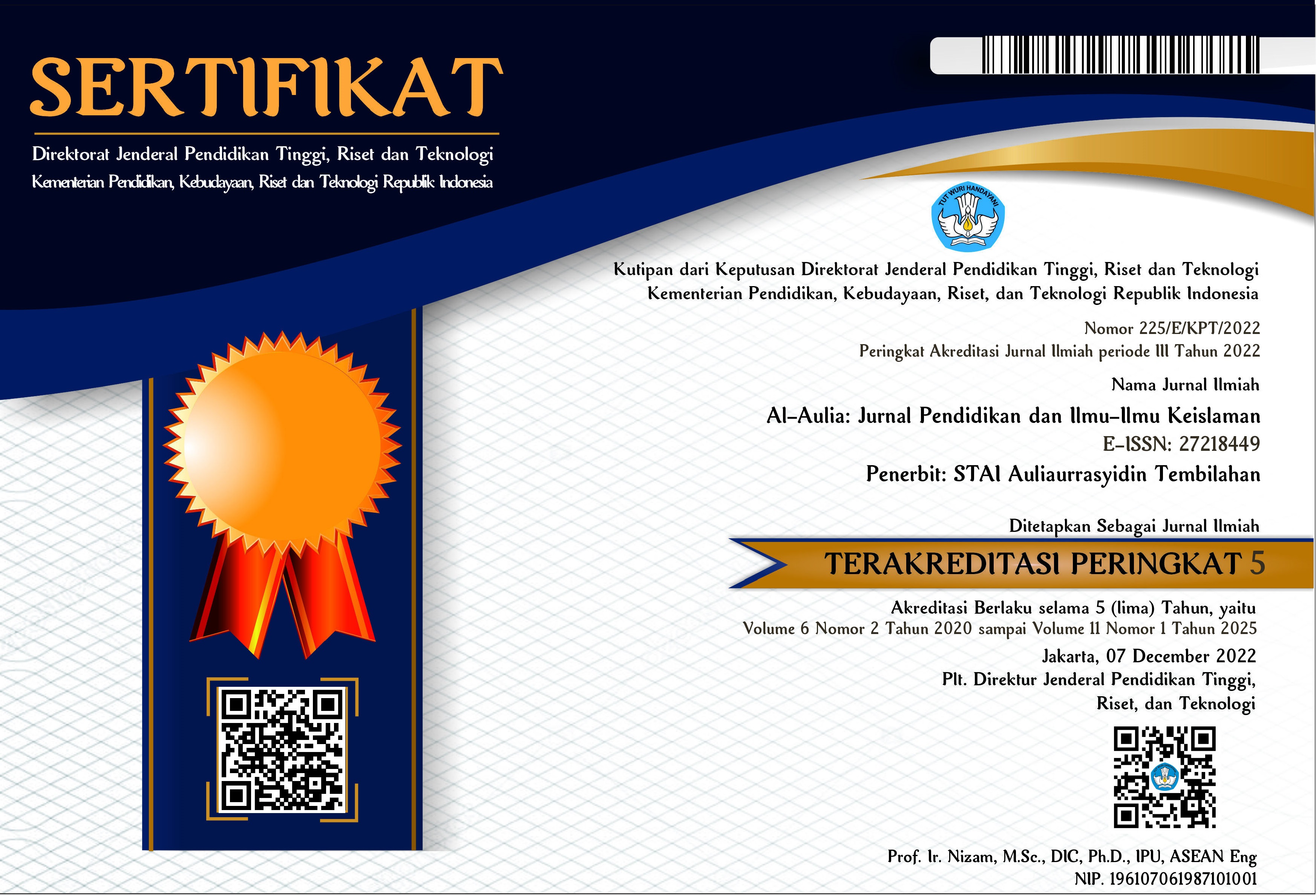Analisis ayat-ayat tarbawi dalam surah al-baqarah menurut tafsir al-misbah dan relevansinya dengan tujuan pendidikan Islam
DOI:
https://doi.org/10.46963/aulia.v11i1.2952Keywords:
Tarbawi Verse, Surah Al-Baqarah, Tafsir Al-Misbah, Goals of Islamic Education, Quraish ShihabAbstract
This research aims to analyze the tarbawi verses in surah al-Baqarah according to Tafsir al-Misbah by M. Quraish Shihab and examine their relevance to the objectives of Islamic education in surah al-Baqarah verses 21, 30, 200, and 247 which contain fundamental educational values in Islam. Using a qualitative-descriptive approach with literature study methods and content analysis. Tafsir al-Misbah is used as the main source in interpreting the meaning and values of education. The results of the research show that these verses contain the basic principles of Islamic education, such as instilling faith and devotion to Allah SWT, becoming a caliph/leader, achieving happiness in the afterlife, forming Muslims with strong and noble morals. These values are in line with the goals of Islamic education which include the formation of people who believe, have noble character, and are able to carry out the duties of the caliphate on earth. Thus, according to Tafsir al-Misbah, Surah al-Baqarah is relevant as a conceptual and practical basis in formulating the goals of Islamic education.
References
Abdul Mijib & Jusuf Mudzakkir. (2008). Ilmu Pendidikan Islam. Jakarta: Prenada Media Groupcet.
Kementerian Agama R I. (2007). Al-Qur’an dan Terjemah. Bandung: PT Sygma Examedia Arkanleema.
M. Quraish Shihab. (2011). Tafsir Al-Misbah Pesan, Kesan dan Keserasian A-Qur’an. Jakarta: Lentera Hati.
Much. Machfud Arif & Nur Alisa Rahmawati. (2022). Pendekatan Hermeneutika Dalam Studi Islam. Jurnal Tadris, 16.
Muhammad Irham. (2013). Psikologi Pendidikan: Teori Dan Aplikasi Dalam Proses Pembelajaran. Yogyakarta: Ar-Ruzz.
Nuria Sundari, Mawaddah Warrahmah, & Ahmad Nurkholiq. (2023). Tujuan Pendidikan Islam Dalam Al-Qur’an Dan Hadist. Jurnal Multidisiplin Indonesia (JMI), 2.
Ramayulis & Mulyadi. (2016). Bimbingan Konseling dan Islam. Jakarta: Kalam Mulia.
Sugiyono. (2018). Metode Penelitian Kombinasi (Mixed Methods). Bandung: Alfabeta.
Downloads
Published
Issue
Section
License
Copyright (c) 2025 Rabiah Al-Husna Nst, Erawadi Erawadi, Sumper Mulia Harahap

This work is licensed under a Creative Commons Attribution-ShareAlike 4.0 International License.
Authors who publish with this journal agree to the following terms:
1. Copyright on any article is retained by the author(s).
2. The author grants the journal, right of first publication with the work simultaneously licensed under a Creative Commons Attribution License that allows others to share the work with an acknowledgment of the work’s authorship and initial publication in this journal.
3. Authors are able to enter into separate, additional contractual arrangements for the non-exclusive distribution of the journal’s published version of the work (e.g., post it to an institutional repository or publish it in a book), with an acknowledgment of its initial publication in this journal.
4. Authors are permitted and encouraged to post their work online (e.g., in institutional repositories or on their website) prior to and during the submission process, as it can lead to productive exchanges, as well as earlier and greater citation of published work.
5. The article and any associated published material is distributed under the Creative Commons Attribution-ShareAlike 4.0 International License







